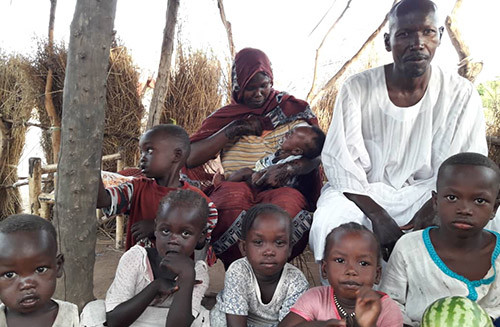Suffering in Sudan
 The global pandemic of COVID-19 is hitting the world’s poor the hardest. It is estimated that over the next few months, an additional 71 million people worldwide will be forced into extreme poverty. The economic shock waves of the coronavirus are causing millions of people to become food insecure. It is expected that many more people are likely to die from a lack of nutrition than from the disease itself. Malnutrition and conditions of poverty make people even more vulnerable to the virus.
The global pandemic of COVID-19 is hitting the world’s poor the hardest. It is estimated that over the next few months, an additional 71 million people worldwide will be forced into extreme poverty. The economic shock waves of the coronavirus are causing millions of people to become food insecure. It is expected that many more people are likely to die from a lack of nutrition than from the disease itself. Malnutrition and conditions of poverty make people even more vulnerable to the virus.
Burie, 38, lives in Sudan with his wife and six children, whose ages range from two to eight years old. They live in a small house they have made for themselves out of local materials. They have a small plot of land that they use for growing the food they need to survive.
This year their crop was wiped out by locusts.
To help provide for his family, Burie takes on as much casual labour as he can find. But in his community, the labourers are many and the jobs are few. It has been difficult for him to get enough income to cover even the most basic necessities. Even uniforms for his school-age children has been extremely hard to afford. He says: “Life has been difficult. We have suffered a lot. We lack a lot of the most basic things. But we still have been able to cope and have managed to live in peace, even in our struggles.”
With the outbreak of COVID-19, those struggles have increased dramatically. Day labour jobs have been even more difficult to find. The price of even the most basic food items has increased beyond their ability to purchase, if they can be found in the local markets at all. The city market is too far and the rental of the cart too much. Burie says:
“I am only able to purchase about one-fifth of the sorghum I used to buy to feed my family. During difficult times we traditionally rely on support from extended family, but due to travel restrictions, we have not been able to reach out to them. Our children used to be able to take a hot meal at their school, thanks to the ADRA school feeding program from Canada, but now that the schools are closed, we no longer even have that.
ADRA has been working in our community for the last 10 years. They have provided many services that our local village has not been able to provide. They have helped us with water and sanitation and other non-food items that help promote hygiene and sanitation. Just two days ago they distributed soap for us to be able to follow the recommended handwashing to prevent the spread of the virus. We have not been able to afford soap. ADRA has also helped us establish farmer’s groups where they provide education and distribute seeds.
All of us here in this village are grateful for the work that ADRA is doing here.”
ADRA is thankful for the funding provided by our generous supporters and the government of Canada which is making this assistance possible.
Let's make a difference together!
Related News and Stories
- News Releases, Stories
- News Releases
- News Releases, Stories
- News Releases, Stories